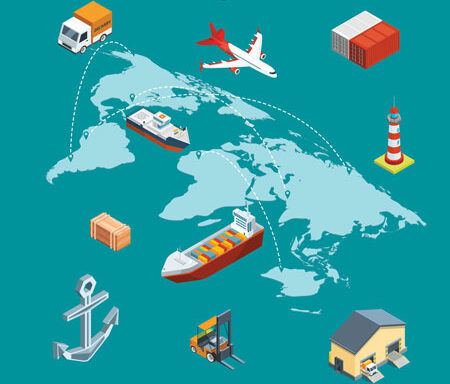Frieght Forwarding
Home > Services> Frieght Forwarding
Frieght Forwarding in India
It is required to be top-notch in not one but a the services provided to stand out in this age of intense competition. Transportation is of paramount importance, thanks to globalization and the internet. One of the most favored methods of domestic and international transport is freight forwarding, which has gained significance in business and personal use. Transporting goods from one destination to another can be done through several carriers like air freight, land freight, and sea freight. But this whole process of freight forwarding services seems challenging just by the thought of it. But the reality is different if you know the right company that will provide you with hassle-free and expert freight forwarding services in India. By acting as a middleman between businesses and carriers, freight forwarders take the complexity out of international shipping, making it easier for companies to import and export goods. They manage the logistical challenges, ensuring that products are delivered on time, within budget, and in compliance with relevant regulations.

Freight forwarding can be categorized based on the mode of transportation, nature of service, and types of cargo. Here are the key types of freight forwarding services:
By Mode of Transportation
Freight forwarding can be classified by the type of transport used to move goods.
- Air Freight:
- Involves the shipment of goods via aircraft. Air freight is often the fastest and most expensive form of transportation, used for high-value or time-sensitive shipments.
- Common for international express shipments or goods that need to reach a destination quickly.
- Sea Freight (Ocean Freight):
- The shipment of goods via cargo ships. It is the most cost-effective way for large shipments over long distances, particularly for international trade.
- Sea freight is slower than air freight but is typically used for bulky goods, such as machinery, raw materials, or large quantities of goods.
- Road Freight:
- Involves transportation of goods by truck or other land vehicles. This is common for domestic shipments or cross-border trade between neighboring countries.
- Road freight is highly flexible, offering door-to-door delivery options.
- Rail Freight:
- The use of trains for transporting goods, often used for long distances over land where rail networks are developed.
- Rail freight is efficient for bulk shipments and can be more environmentally friendly than road freight.
By Type of Service
Freight forwarding services can also be categorized based on the type of service offered.
Full Container Load (FCL):
- In FCL shipments, the shipper has exclusive use of a full container for their goods.
- FCL is ideal for large shipments, offering better security and cost efficiency per unit of cargo.
Less than Container Load (LCL):
- LCL involves consolidating shipments from multiple clients into a single container, with each client only paying for the portion of the container their goods occupy.
- This is ideal for smaller shipments and helps save costs but can be slower due to the need for consolidation and deconsolidation.
Breakbulk Shipping:
- Used for goods that cannot fit into containers, such as heavy machinery, large industrial equipment, or other over-sized cargo.
- These goods are typically loaded individually onto ships, and this service requires more specialized handling.
Door-to-Door:
- This service involves the freight forwarder picking up goods from the sender’s location (door) and delivering them to the recipient’s destination (door).
- It’s a more comprehensive service that includes everything from pick-up, transport, and final delivery, often involving multiple modes of transport.
Port-to-Port:
- This service involves only the transport between two ports (from the origin port to the destination port).
- The shipper or receiver is responsible for handling goods from the port to their respective destinations.
Expedited Freight:
- Expedited services are for fast delivery, often requiring air freight or priority sea/road transport.
- It’s used for time-sensitive deliveries and is generally more expensive.
By Type of Cargo
Different types of freight forwarding are needed depending on the nature of the goods being shipped.
- General Cargo:
- Standard goods like consumer products, textiles, electronics, and other typical items that are packed in containers or pallets.
- Perishable Goods:
- Goods that are highly time-sensitive and require specialized temperature control during transit, such as food items, pharmaceuticals, and other temperature-sensitive products.
- Hazardous Materials (HAZMAT):
- This type of freight requires special handling due to its dangerous nature, including chemicals, flammable items, and other hazardous materials.
- Strict regulatory compliance is required for the safe transport of these goods.
- Project Cargo:
- Heavy, oversized, or difficult-to-handle cargo often linked to large projects such as construction, mining, and energy.
- These shipments may require specialized equipment, planning, and handling due to the size or complexity of the cargo.
By International Freight Services
- Import Freight:
- Focused on the delivery of goods entering a country. It involves coordinating customs clearance, taxes, duties, and the necessary documentation for international shipments.
- Export Freight:
- The movement of goods out of a country, often involving export documentation and complying with the legal requirements of the destination country
